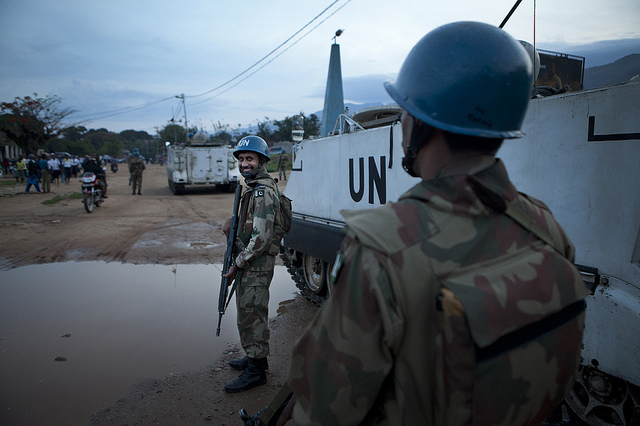
In the coming days, the United Nations Security Council will be debating the mandate of the U.N. mission in Congo known as MONUSCO, the world’s largest peacekeeping force. One of the key decisions the U.S., U.K., France, and the other Security Council members will be deciding is whether to incorporate an intervention brigade into MONUSCO to combat spoiler armed groups. But apart from the brigade, the $1 billion-per-year U.N. mission can make a concrete difference on the ground in other areas like encouraging defections from armed groups and combating smuggling. Based on a recent trip to eastern Congo and conversations with U.N. peacekeepers themselves, here are three ideas that I would want my taxpayer dollars to go toward:
1. Refocus MONUSCO's mandate to have an enhanced, properly resourced defections program, as part of a focused strategy to deal with armed groups. While a possible foreign intervention brigade will likely have a peace enforcement mandate as a "push" factor for armed groups, it will be critical to have a "pull" factor for their rank-and-file combatants and junior officers to draw them out. This two-pronged strategy is already having an effect on increasing defections from the Lord’s Resistance Army. Now is a timely opportunity to have an enhanced defection strategy for MONUSCO, as armed groups have increasing less access to natural resources because of new international due diligence measures that make it difficult to sell conflict minerals. This makes their fighters more vulnerable to defection efforts. MONUSCO's disarmament, demobilization, repatriation, reintegration, and resettlement program, or DDR/RR for foreign armed groups has had some success but is under-resourced. The Congolese government took on disarmament, demobilization, and reintegration, or DDR, for domestic armed groups but has done little to implement it.
The programs should include several components. First, there could be a community reintegration program that benefit both local communities and ex-combatants. This could include joint projects that have both groups working together on agriculture or small business projects, in order to not incentivize the creation of new armed groups simply to receive DDR packages, which has been the case in the past. Other components of the strategy could include a new leaflet dropping strategy, radio programs aimed at luring combatants out of the armed groups, the relocation and resettlement of ex-combatants to other provinces, and the creation of new demobilization centers.
2. Include monitoring of the illicit trade in natural resources as part of the MONUSCO Military Observers' mandate. Despite the legislative and due diligence reforms that have made it more difficult to sell conflict resources on global markets, smuggling continues to occur, particularly of gold. Building on lessons from other U.N. peacekeeping operations in West Africa, the Military Observers, or MILOBS, team of 700 observers should be deployed to resource-rich areas such as Walikale and be mandated to examine minerals trading routes, and search, monitor, and report on illicit trafficking. These eyes and ears on the ground would help provide a useful check on smuggling networks.
3. Include strengthening the capacity of the Congolese government to combat smuggling in the MONUSCO mandate. Several Congolese government agencies are in charge of combating smuggling — from mining police to customs to SAESSCAM. However, they lack proper accountability and transparency mechanisms, and many engage in smuggling themselves. U.N. officers should be seconded to the Police des Mines, Customs Department, and SAESSCAM to train and help set up accountability and transparent smuggling reporting systems for these agencies.
Photo: MONUSCO peacekeepers patrol in Uvira, South Kivu (MONUSCO)

